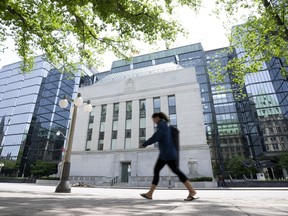Biggest vulnerability remains higher household indebtedness
Article content
The Bank of Canada warned that threats to the financial system have grown more complicated in recent months as the country grapples with tightening monetary policy, rampant global inflation, and geopolitical tensions. However, the biggest vulnerability remains higher household indebtedness, the central bank highlighted in its latest Financial System Review.
Advertisement 2
Article content
Policymakers said they are facing a “delicate balancing act,” as surging inflation will force them to raise interest rates over the months ahead, even though Russia’s invasion of Ukraine has rocked global stability and the pandemic continues to hinder economic growth.
“Failure to balance these competing objectives could lead to a further global repricing of risk and a sharp tightening of global financial conditions, potentially triggering risks associated with high leverage,” the report said.
High household indebtedness from bigger mortgage volumes and soaring house prices are interwoven issues the central bank said are receiving extra attention, especially as rising interest rates put more strain on the carrying costs of all that debt. As households renew their mortgages, they could find themselves with less disposable income, and potentially tied to less valuable assets if housing markets correct.
Advertisement 3
Article content

Housing has been a concern for years, but now financial markets are emerging as a significant threat to financial stability. The Bank of Canada said that while the Canadian financial system remained resilient throughout the pandemic, global inflationary pressures and the war in Ukraine brought higher volatility in commodity markets and significant market repricing as investors moved away from riskier assets.
The central bank added that tighter global financial conditions would put this resilience to the test, and would more clearly expose system vulnerabilities moving forward. As China pursues a COVID-zero strategy, new outbreaks of COVID-19 are another concern the central bank said it is watching.
Advertisement 4
Article content
Countries emerging from the pandemic have lifted restrictions, bringing robust demand for goods and services, straining supply chains. These factors working in tandem pulled inflation up to multi-decade highs. As the central bank tightens its policy to put a lid on inflation, corporate bond yields hit multi-year highs and borrowing costs for homeowners are soaring.
Policymakers said they are paying particular attention to the greater number of Canadian households carrying a much larger mortgage debt, noting that the number of new mortgages with a loan-to-value ratio of 75 per cent or more has risen 40 per cent in recent quarters. Canadians are taking on larger mortgages compared to their income, with the share of mortgage originations with a loan-to-income ratio above 450 per cent surpassing 25 per cent since the start of the pandemic.
Advertisement 5
Article content
“Higher interest rates at the time of mortgage renewal will significantly reduce the financial flexibility of some households, particularly the most indebted,” the report said, while adding that rising borrowing costs will erode homeowners’ purchasing power if wages cannot keep pace.
Higher interest rates at the time of mortgage renewal will significantly reduce the financial flexibility of some households
Bank of Canada
Assuming variable- and fixed-rate mortgages originating in 2020 and 2021 renew at 4.4 per cent and 4.5 per cent in 2025 and 2026, the central bank estimated that households that took out a mortgage during the pandemic could see a median 30-per-cent boost in monthly mortgage payments once they renew.
Despite household net worth increasing $230,000 on average, the report noted that indebted Canadians may not be able to tap into home equity if the housing market corrects and these wealth gains are wiped out. The lower purchasing power could present a drag on consumption in the economy at a time when the economy is getting back on its feet following the pandemic.
Advertisement 6
Article content
The central bank noted that high house prices and household debt could weigh on projected economic growth, and the probability of negative growth projected for the first quarter of 2024 is nearly two times greater than if these vulnerabilities were not there. An economic disruption lowering household income and spending would hit consumption and weaken housing market activity.
Advertisement 7
Article content
According to Bank of Canada data, home prices have risen over 50 per cent on average during the pandemic with investors disproportionately driving up home prices last year, bringing the risks of a housing correction up with it. Canadian markets are already seeing this moderation take hold as resale activity slowed in March and April. The report noted this could be an “echo effect” as demand was pulled forward, seeing homeowners lock in mortgages before rates rose — or could be “the beginning of the end of the pandemic upswing.”
Most major Canadian housing markets saw higher price exuberance in the first quarter, according to the central bank’s house price exuberance indicator. According to this metric, the Greater Vancouver Area, Hamilton, the Greater Toronto Area, Ottawa, and Montreal are among the most exuberant markets across the country.
Advertisement 8
Article content
Another potential risk the Bank of Canada flagged is a sudden spike in demand for liquidity from asset managers outpacing supply, which poses stronger risks of large price swings and even potential freezes in fixed-income markets. It was an issue the Bank flagged in last year’s report, though a tightening monetary environment this year has reduced liquidity even further.
In an increasingly digital world, the Bank has grown more wary of cyber threats, particularly as the ongoing Russian invasion into Ukraine gives rise to more state-sponsored cyber attacks, which could run the risk of targeting Canadian financial institutions, especially as they grow more sophisticated. The report added that a successful attack could have far-reaching impacts on the broader financial system since financial infrastructure is so inter-connected, causing households and firms to lose access to funds and the ability to move money electronically.
To combat these risks, financial institutions and authorities are investing in cybersecurity improvements to keep pace with sophisticated attacks.
• Email: shughes@postmedia.com | Twitter: StephHughes95
Advertisement
High inflation complicating financial system risks: Bank of Canada
2022-06-09 16:40:26






